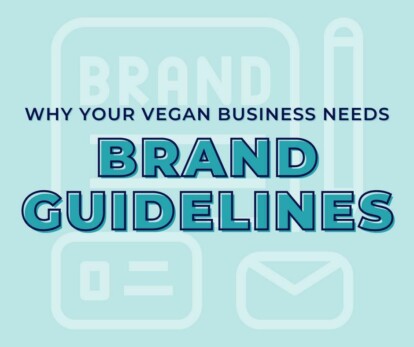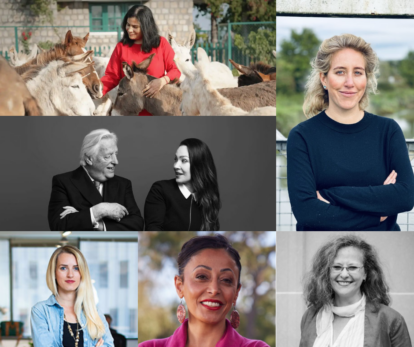Why Your Vegan Business Needs Brand Guidelines (and How to Create Them)


In Part 1 of this blog series, we looked at how the legal system has historically failed our animal kin by treating them as objects, not individuals, and how landmark cases are beginning to shift that narrative.
But landmark cases don’t appear out of nowhere. They’re often the result of years of tireless work by lawyers, campaigners, researchers, and everyday advocates who believe that the law can, and should, do better by our fellow animals.
In this second part of the series, we want to shine a spotlight on some of the people and organisations working tirelessly to create much-needed change.
When you hear the term animal lawyer, you might picture someone helping with vet disputes or representing a person whose dog has bitten a neighbour. But animal law is much broader than that, and far more transformative.
It’s about using the legal system to challenge cruelty, shift public policy, and imagine a world where our fellow animals are seen as someone, not something.
Animal law spans everything from fighting for legislative change, to challenging misleading advertising, to protecting the rights of individual animals used in research, farming, and entertainment.
Some animal lawyers represent sanctuaries or NGOs. Others focus on strategic litigation, using the legal system to challenge the very foundations of how our animal kin are seen by the law.
It’s not easy work. The legal system was built to serve human interests. But that hasn’t stopped a growing movement of legal professionals from demanding something more honest, a legal system that reflects what most people already know: that our animal kin aren’t objects.
There are so many incredible people working in animal law today that we couldn’t possibly name them all. What follows is a snapshot, a few names and organisations that represent the heart and grit of this growing movement. Each one, in their own way, is helping to reshape how the law sees and treats our fellow animals.
Edie Bowles (UK)
Edie Bowles is a solicitor and the co-founder of Advocates for Animals, the UK’s first law firm focused solely on animal protection.
She began her legal career in intellectual property before moving into animal protection work with Cruelty Free International, a shift driven by a deep commitment to justice for our fellow animals.
After founding Advocates for Animals, Edie’s first client was The Donkey Sanctuary where she acted as an external legal advisor around the donkey skin trade. She has since worked with all the major animal aid groups in the UK, including Animal Aid and World Animal Protection.
One of her most high-profile cases was the “Frankenchickens” judicial review, brought by The Humane League UK. It challenged the legality of fast-growing chicken breeds on welfare grounds, asking whether such breeding practices were compatible with UK law. The case didn’t win in court, but it made headlines and raised public awareness about the hidden suffering in our food systems.
Steven M. Wise (USA)
Until his death in 2024, Steven M. Wise was one of the most influential figures in the modern animal rights legal movement. He founded the Nonhuman Rights Project (NhRP), an organisation working to secure fundamental rights for animals like chimpanzees, elephants, and whales.
His legal team filed groundbreaking habeas corpus petitions (usually reserved for humans who have been unlawfully imprisoned) on behalf of chimpanzees Tommy and Kiko, and later Happy the elephant, as well as others, arguing that these autonomous, sentient beings should not be confined in captivity.
While the courts did not grant the animals legal personhood, the cases generated worldwide media attention and opened public debate about the moral and legal status of our fellow animals. In his powerful TED Talk on this topic, Steven remained confident that the law will eventually change.
Steven was also a teacher, a compelling speaker, and the author of Rattling the Cage, a foundational text that helped to inspire a generation of animal lawyers and activists. His legacy continues through the ongoing work of the NhRP and the legal shift he helped set in motion.
Camille Labchuk (Canada)
Once a political staffer (with the strategic mind that requires!), Camille Labchuk is now the Executive Director of Animal Justice, Canada’s only national animal law advocacy organisation.
She has led campaigns against ag-gag laws, fur farming, marine mammal captivity, and live animal transport, and played a key role in passing the 2019 federal ban on keeping whales and dolphins in captivity.
For four years, Labchuk co-hosted a podcast called Paw & Order with animal lawyer Peter Sankoff and journalist Jessica Scott-Reid, where they broke down animal law in ways that felt relevant and accessible to a non-legal audience.
Labchuk is a passionate speaker and media commentator who brings legal credibility and public-facing clarity to animal advocacy in Canada.
David Favre (USA)
As a professor of law at Michigan State University, David Favre is seen as one of the most respected academic voices in the field of animal law. His academic work explores how laws can evolve to recognise the interests and rights of animals while working within existing legal frameworks.
Favre developed the concept of “living property“, a proposal that recognises our fellow animals as sentient individuals with interests, even within a legal system that currently treats them as property.
Favre has written a number of books, including Animal Law: Welfare, Interest, and Rights (3ed), and Respecting Animals. He is also the creator and Editor-in-chief of the Animal Legal and Historical Web Centre, the largest legal website devoted to animal issues in the world.
David was a founding board member of the Animal Legal Defense Fund and of the American Bar Association (ABA) Committee on Animal Law. He is also a featured expert for the Global Animal Law Association.
Lesli Bisgould (Canada)
Listed by Animal Justice as one of 13 incredible women lawyers who are driving change in animal law, Lesli Bisgould was Canada’s first dedicated animal rights lawyer and has spent years pushing back against laws that treat our animal kin as expendable (her 15-minute TED Talk on this topic is well worth a watch).
She wrote Canada’s first legal textbook on animal law (Animals and the Law: Essentials of Canadian Law) and has taught at the University of Toronto’s Faculty of Law.
From challenging breed-specific bans to questioning how animal cruelty laws are (or aren’t) enforced, Bisgould continues to shape the conversation around what meaningful legal protection could look like.
Shatha Hamade (Australia)
Shatha Hamade is a solicitor and Legal Counsel for Animals Australia, where she’s spent years tackling some of the country’s most entrenched systems of animal exploitation, including live export and factory farming.
During her career, she’s taken on slaughterhouses, challenged cruelty in the courts, and brought animal suffering out of the shadows through sharp legal strategy and undercover investigative work.
In 2024, she received the Voiceless Brian Sherman Animal Law Prize in recognition of her advocacy. Shatha’s work reminds us how powerful the law can be when it’s used to confront and demand better from industries that treat animals as commodities.
Lorna Hackett and Michael Mansfield KC (UK)
In 2022, the Scrap Factory Farming campaign brought a novel argument before the UK High Court and the European Court of Human Rights: that factory farming isn’t just bad for animals, it also poses serious risks to human health and the environment.
Human rights barrister Lorna Hackett, known for her work on public interest litigation, and Michael Mansfield KC, one of the UK’s most respected legal minds, led the case.
Together, they helped reframe intensive animal agriculture as a human rights issue, making the case that failing to address the risks of zoonotic disease, antibiotic resistance, and environmental harm could have consequences for us all.
The case was ultimately dismissed, but it marked a shift in legal storytelling. Hackett and Mansfield showed how lawyers from outside the animal law sphere can bring fresh perspective, rigour, and reach.
At the time of the case, the pair also co-hosted a podcast called Two Heads, where they discussed social justice issues ranging from law to global inequality.
Gauri Maulekhi (India)
In India, Gauri Maulekhi is a leading voice for animals who are often invisible in the legal system. As a trustee of People for Animals, she’s been behind some of the country’s most important animal protection cases, including legal actions to stop mass animal sacrifices and to ensure the welfare of animals during natural disasters.
When floods devastated Uttarakhand in 2013, Gauri coordinated the rescue of over 6,000 animals. She later pushed for systemic change, helping to establish legal requirements for animals to be included in disaster management planning.
Her work builds on groundbreaking Indian court rulings that have recognised animal personhood and constitutional protections, and she continues to turn these legal principles into action.
The fight for animal justice is rarely a solo mission. Behind most of the trailblazers we’ve mentioned are organisations that bring people together, offering collective strength, shared strategy, and the power to think bigger than any one case or campaign.
These groups are helping to push the law forward while also nurturing the next generation of lawyers who believe our fellow animals deserve legal protection and legal recognition.
Again, this isn’t a full list, but a helpful starting point:
One of the most exciting developments in recent years is the growth of animal law as a legitimate academic subject. More than 160 law schools worldwide now offer courses on the topic, including Harvard, Lewis & Clark, and Cambridge.
In the UK, Advocates for Animals and ALAW each coordinate student networks and internships to help nurture the next generation of animal lawyers.
Many of the trailblazers we’ve mentioned – from Steven Wise and Camille Labchuk to Edie Bowles and Lesli Bisgould – have helped to shape this shift in legal education, whether by writing foundational texts, teaching, mentoring, or leading by example in the courtroom.
There’s still a long way to go before our fellow animals exist as legal “persons” in the eyes of the law. Most legal systems remain deeply speciesist.
But change is coming.
Animal lawyers are knowingly playing a long game using carefully chosen cases to shift public perception. As a result, sentience laws are gaining ground, and the idea that animals should have legal rights is no longer confined to academic journals; it’s being tested in courtrooms across the globe.
Many of these legal efforts also connect with broader movements: climate justice, public health, Indigenous rights, and food justice. These aren’t separate battles; they’re strands of the same fight for a fairer and more compassionate world.
The lawyers and legal thinkers featured here are doing more than winning cases. They’re reimagining what justice looks like. This means making space – be it slowly and persistently – for our animal kin to be recognised not as things, but as lives with meaning, memories, preferences, and intrinsic value.
They remind us that the law, like all human systems, can evolve and, in doing so, they offer hope of a future where justice truly means justice for all.
If you’re curious about how you can get involved, many of the organisations above offer internships, events, and ways to lend your voice to the movement.